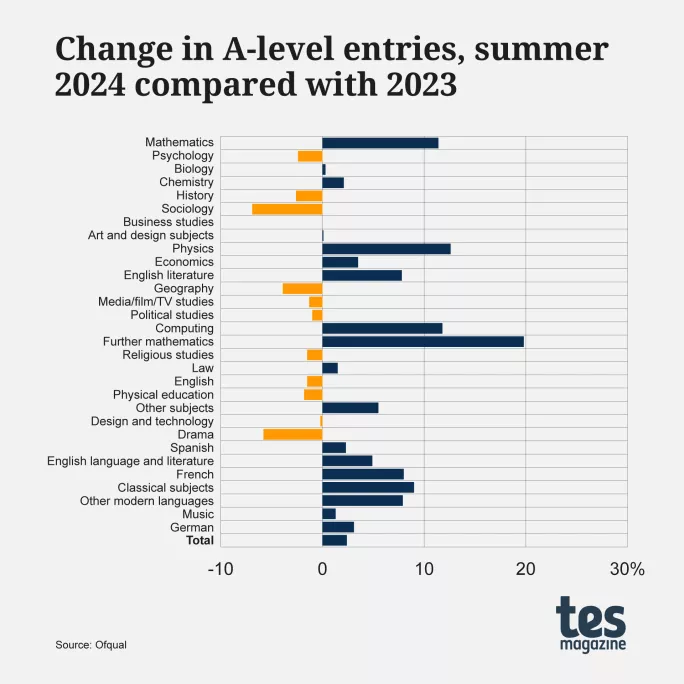
Maths to dominate exam results days and 6 other trends

There are now just four weeks until 2024 GCSE exam results are published and three weeks until A-level results.
While the wait for results will feel like an eternity for students - and then hopefully end in a moment of joy for them and their teachers - there are some wider trends that we can be sure of due to provisional exam data published earlier this year.
GCSE and A-level exam entry trends
Here are some of the key insights ahead of exam results season:
1. Maths on the rise
Maths remains one of the most popular GCSEs, with entries rising by 7.1 per cent, from 786,815 last year to 842,595 this year.
Meanwhile, A-level maths cemented its position as the most popular A level, with entries rising 11.4 per cent from 90,845 to 101,230.
Further maths showed an even more significant boost, with A-level entries rising 19.8 per cent, from 14,535 to 17,420.
Given these increases, maths departments and their teachers no doubt face some anxious moments as results data comes in.

2. Other Stem subjects grow in popularity, too
The push for more students to take science-based A levels has had a clear impact over the past few years and 2024 is no exception, with data showing rises across key subjects.
Most notably, physics entries grew 12.6 per cent, from 35,815 in 2023 to 40,320 in 2024.
Meanwhile, computing has had an 11.8 per cent increase, from 17,420 to 19,475 entries.
Chemistry and biology had more modest increases (2.1 per cent growth and 0.3 per cent growth respectively).
At GCSE, science entries rose, too, but not by such margins. The combined science GCSE did cement its position as the most popular GCSE, however, rising 5.1 per cent from 881,925 to 926,780 entries.
3. More students = more exams
While some of these increases have been driven by new interest from students, a big factor behind some of the growth is simply the fact that more students took exams this year due to a larger pupil population.
The Department for Education data shows that there was a 5.2 per cent increase in the number of 16-year-olds in England compared with last year, from 663,078 to 697,673.
The number of GCSE entries has increased by 4.8 per cent, from 5,543,840 to 5,811,790 this year.
The number of students sitting A levels, meanwhile, rose by 1.2 per cent, from 648,066 in 2023 to 655,635 this year. This meant there was a 2.4 per cent year-on-year increase in entries, which grew from 806,410 to 825,390.
4. AS-level entries continue to fall
However, as has been the trend in recent years, entries for AS level continue to fall, dropping by 4.5 per cent this year, from 62,785 entries last summer to 59,935.
- GCSEs 2024: Teachers complain of “obscure” English lit GCSE extract
- Curriculum: Experts warn of an “arts apocalypse” in schools
- A-level exams 2024: Dates, timetables and key information
The Department for Education acknowledges that this is likely due to the decoupling of AS and A levels that began in 2015, and the latest decline may give schools that still offer AS levels further thought about whether they wish to continue doing so.
5. German uptake remains low
While some subjects are booming in terms of entries and clearly benefitting from a large pupil cohort, others are faring less well.
Like last year, German remains bottom of the subject list for A-level entries, with just 2,280 students across England taking the language.
Although this number represented a 3.1 per cent rise on last year, when there were 2,210 entries, the overall low total suggests that the subject is still struggling to attract students - despite a push from the DfE.
6. Other languages fare a little better
Languages remain at the least popular end of both the English Baccalaureate (EBacc) and A-level subject tables, although those languages with more widespread international appeal are more favoured than German in both cases.
French had a 3.2 per cent rise in EBacc entries, from 126,560 last year to 130,650 this year. The rise of Spanish was more significant at 6.8 per cent, from 121,670 to 130,650.
At A level, French entries increased by 8 per cent from 6,510 to 7,035. Spanish remained more stable year-on-year, with a 2.3 per cent increase, from 7,545 last year to 7,720 this year.
7. Drama, sociology, psychology and more in decline
Despite the opportunity for growth due to higher student numbers, several subjects showed a decline in entries.
At A level, the subject with the biggest percentage decrease was sociology, which dropped 6.9 per cent, from 45,730 to 42,575. The subject has been overtaken by history and is now the sixth most popular, having ranked fifth last year.
The next biggest decrease at A level was drama, for which entries dropped 5.8 per cent, from 8,385 to 7,895.
At GCSE, entries for drama, a non-EBacc subject, were down by 0.8 per cent, from 49,825 to 49,410.
Entries for geography A level decreased by 3.9 per cent, from 34,870 to 33,505. Meanwhile, history had a 2.6 per cent drop, from 44,545 to 43,410.
More surprising is the drop in entries for psychology at A level, which decreased 2.4 per cent from 78,015 to 76,130. The subject remains the second most popular (after maths), as it has been for the past few years.
Other subjects that had a small decline in A-level entry numbers included media/film/TV studies, political studies, religious studies, English, physical education and design and technology.
Ellen Peirson-Hagger is senior writer at Tes
For the latest education news and analysis delivered directly to your inbox every weekday morning, sign up to the Tes Daily newsletter
You need a Tes subscription to read this article
Subscribe now to read this article and get other subscriber-only content:
- Unlimited access to all Tes magazine content
- Exclusive subscriber-only stories
- Award-winning email newsletters
- Unlimited access to all Tes magazine content
- Exclusive subscriber-only stories
- Award-winning email newsletters
You need a subscription to read this article
Subscribe now to read this article and get other subscriber-only content, including:
- Unlimited access to all Tes magazine content
- Exclusive subscriber-only stories
- Award-winning email newsletters
- Unlimited access to all Tes magazine content
- Exclusive subscriber-only stories
- Award-winning email newsletters
topics in this article



